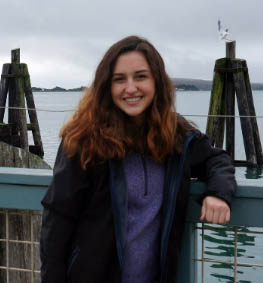Sarah Karver

Growing up with a fuzzy idea of what sustainability even was, Sarah has come so far. She pursues a "low impact" lifestyle and shares her methods on and off campus! She is an undergraduate studying international studies and marketing on top of her committment to Green Love and a nonprofit literacy off campus.
How did sustainability play a role in your life growing up, if at all?
It didn’t at all! I still shudder when I think back on my childhood when I would carry my lunch in a different plastic bag everyday. Living in a suburban city meant my family relied heavily on cars and most of the adults in my life were convinced that the green movement was all “bug-eating liberals.” If anything, growing up in an unconsciously anti-environment space allows me to see sustainability through a different lens. Now, I can interact differently with people who typical don’t care about sustainability because I’ve been there.
When did you first hear about the idea of zero waste and what influenced you to take up a strain of this lifestyle?
My original introduction to sustainability came through learning more about the fast fashion industry, which I got interested in because of human rights and social justice issues. I started following YouTube influencers in that space who led me to other members of the YouTube sustainability community (mostly zero wasters). The zero waste movement actually began as a business practice and was transformed into a personal lifestyle movement. One YouTuber in particular, Sustainably Vegan, created an alternative to the zero waste movement called the “low impact” movement. The message is about going beyond physical waste, which is almost impossible as everyday people can’t get to the illusive zero. Instead low impact concentrates on how to reduce one’s personal impact through consumption but also through lifestyle choices, like transit. I connected with that message and the focus on holistic change centered around doing what you can, at any income level. For myself, the low impact movement/zero waste movement just seemed like the right thing to do: for myself and personal mindfulness goals, for the health of our planet, and for advancing human rights and equality issues which tie completely with environmental issues as well.
What was the most difficult part of your transition journey?
Being an advocate and using my voice. It’s one thing to bring jars into Sprouts and accidentally cause a line traffic jam because the cashier hasn’t had anyone use a jar in place of a plastic bag before. That’s a great first step. But going beyond the sometimes embarrassing moments of feeling like a burden to explaining the why of my actions is still difficult for me. I’ve found that approaching with kindness and making light of a teaching moment (without being preachy!) is so important in getting more people involved in the movement.
Is there something you just have not found a good substitute for?
Bread! Tortillas! Plant-based milk! My weaknesses. Surprisingly, my entire grocery trip is package free or comes in recyclable materials except these three things. Trying to make these at home failed miserably and in the end was not cost effective. The good news is I’ve found a way around the bread and tortilla bags; I reuse them for the bulk bins! Being low impact is all about letting your creative juices flow and finding new uses for single use items. One of the biggest misconceptions is people see the zero-waste movement as replacing plastic with more sustainable alternatives, such as glass and metal. This is one way to go about it (and it looks beautiful of course) but using what one already has is truly the most sustainable option.
What are some zero waste (low impact) campus hacks?
Personally, I bring my own lunch to campus which helps save a lot of unnecessary packaging and is usually healthier. I’ve always got my zero waste kit: a little pencil-like pouch with utensils and a collapsible bag. One great thing about being conscious of waste production is I’ve saved a lot of money by forgoing BCB coffee runs when I haven’t brought my cup. The biggest thing is to come prepared and think ahead, which is also a great way to practice mindfulness in general.
Any goals for the future on spreading this or incorporating it into your current/future career?
Currently I have a fledgling YouTube channel (https://www.youtube.com/c/sarahkarver) where I talk about slow and intentional living which includes topics such as travel, zero waste, and fashion. It’s something that brings me joy and that allows me to talk about issues that matter to me and (hopefully) get more people thinking critically about the consumer culture that has reached beyond its growth limitations. After SDSU I hope to work in marketing for an environmental company (non-profit or private), then return to graduate school for a masters degree, and eventually work in environmental public policy or research.
Do you have any advice for other students trying to be zero waste/low impact that is not well-known?
It’s not an all or nothing game! One of the reasons I prefer the low impact movement is because it doesn’t have a limiting goal in the title, like zero-waste. Living in San Diego, there aren’t options to compost through the city yet, which means I still produce food waste. I don’t believe this should bar me from a movement. The number one thing to start reducing your impact is to use what you already own and go from there. Also, try looking at things from a holistic perspective. Cotton produce bags may save the use of plastic, but what about the resources that goes into them? Take some time to slow down and think about the items in your life and be skeptical of those who claim you have to fit a particular mold to be part of a movement. In the end, helping preserve the planet is the most important thing
